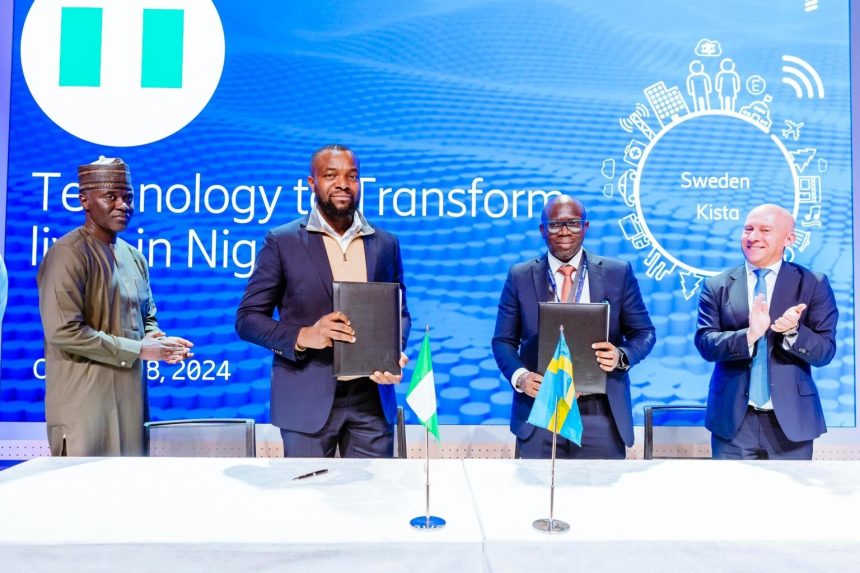The Nigerian government has signed a memorandum of understanding (MoU) with Ericsson to establish a framework of cooperation on fifth-generation (5G) technology development, deployment, and innovation.
Bosun Tijani, minister of communications, innovation and digital economy, signed the MoU on behalf of Nigeria while Peter Ogundele, country manager, Ericsson Nigeria, signed for the company.
The MoU, which was signed at the Ericsson global headquarters research and development lab in Kista, North of Stockholm, Sweden, was witnessed by the Vice-President, Kashim Shettima, and Patrick Johansson, Ericsson senior vice-president and head of business area, Middle East and Africa.
The company also made a presentation to Shettima about its 5G technology evolution, radio spectrum matters and standardisation, as well as cyber and network security by Ericsson professionals.
Speaking after the presentation, Shettima enquired about the possibility of the company deploying its 5G technology to assist Nigeria in improving the security of its oil facilities.
Ogundele, the company’s managing director, said Ericsson has been active in Nigeria since independence and was formally registered in 1978 — adding that the company has partnered with the Nigerian Communications Commission (NCC) and other organisations on capacity building for 25 years.
“We can train them, Ericsson will also take part in it, and some of them can be exported into the world,” Ogundele said.
On digital skills development, Akinola Jones, director at Gluwa, a digital wallet service, said the company would train over 30,000 people under the ‘renewed hope agenda’ of President Bola Tinubu’s administration.
He added that once the firm’s satellite launches in December 2024, Nigerians would connect directly to it, marking a significant milestone for the country’s tech ecosystem.
Jones said his company has started training 1,000 people in Jigawa state and plans to extend it across northern Nigeria. “We have given about 100 million dollars in loans. It’s not just about disbursing loans or growing portfolios; it’s really about giving back.
“We are aiming for a lot of impact and are working with the government and presidency to train people on digital skills. And when it comes to funding, we’ve been very innovative. It’s not always about foreign funds; local solutions to local problems matter.”
‘A NEW NIGERIA IS CALLING, AND WE ARE READY FOR BUSINESS’
Speaking at the forum, Vice-President Kashim Shettima assured the Swedish investors of Nigeria’s readiness for business, highlighting the global transition to a green economy.
He said the world’s economic focus is shifting towards Africa and that Nigeria could play a crucial role in the transition.
Shettima, currently in Sweden for a two-day working visit, is representing Tinubu in bilateral talks.
He is expected to engage in high-level bilateral talks with key government officials, including a meeting with Crown Princess Victoria of Sweden and the Swedish prime minister.
“Nigeria, a country of 220 million people, will surpass the United States by 2050 to become the third most populous nation on earth,” Shettima said.
“By the end of the century, Nigeria will be the most populous nation. Population offers opportunities. People celebrate China for its population and ingenuity.
“The Nigerian digital ecosystem is eager for support and investment. Nigeria beckons—a new Nigeria is calling on you, and we are ready for business.”
Shettima also expressed confidence in Nigerian youths and urged investors to “seize the moment”.
“With the Renewed Hope Agenda of President Bola Tinubu, this is the best time to invest in Nigeria,” he said.
Hakan Danhltor, director of project accelerator at Swedfund, said Nigeria holds the third-highest exposure in the organisation’s portfolio, reflecting their investment in the country.
Danhltor affirmed Swedfund’s commitment to reducing poverty and promoting sustainable development through private-sector investments.
“As a matter of facts, Nigeria is a country where we have the third highest exposure in our recurrent portfolio. We have more than 30 direct to indirect investment in Nigeria in different sector but a lot of them are in the energy sector, helping to use clean energy from the renewable energy,” he said.
On her part, Mikaela Edstrom, of the Swedish Export Credit Agency, praised Nigeria’s economic reforms as a positive step for the country’s future, stating that the agency is closely monitoring its progress.
Edstrom said Swedfund is collaborating with the Nigerian Communications Commission (NCC) to increase broadband access in Nigeria and expressed enthusiasm for continuing the discussions, noting that the fund seeks new areas of partnership.






